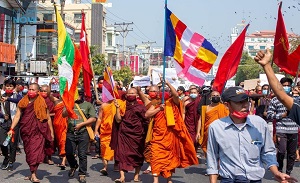An evolving Buddhist nationalism and the new role of Burmese youth
 Milan (AsiaNews) – On 4 January 1948, Myanmar (then known as Burma) declared its independence ending British colonial rule. After exactly 75 years, the country finds itself marking the anniversary amid a brutal civil war sparked by a military coup in February 2021, just the latest in the country’s troubled history.
Milan (AsiaNews) – On 4 January 1948, Myanmar (then known as Burma) declared its independence ending British colonial rule. After exactly 75 years, the country finds itself marking the anniversary amid a brutal civil war sparked by a military coup in February 2021, just the latest in the country’s troubled history.
One of the most interesting processes of transformation concerns Buddhist nationalism, which has gone through at least three periods, this according to Professor David Moe, of Yale University, who hails from Chin State, a mostly Christian state.
“Before independence, Buddhist nationalism was predominantly anti-colonial and anti-Western, so it brought together different groups, from Buddhist monks to peasants and students," said the scholar, speaking to AsiaNews.
“From 1948 onwards, however, that kind of nationalism was directed against ethnic and religious minorities, particularly Muslims and Christians, while Buddhist identity began to overlap with the ethnic identity of the Bamar majority."
Myanmar is home to about 135 distinct ethnic groups, with eight main ones. The Bamar, who are concentrated mainly in the country’s central region, represent 68 per cent of the population.
Even in the pre-independence period, ethnic minority groups, living mostly in the mountainous areas along Myanmar's borders, have organised themselves independently, setting up their own militias to fight against the central government.
Over the years, ethnicity has played an increasingly important role, “so much so that even today the identity card of every Burmese indicates the ethnicity and religion of its bearer", said Prof Moe, whose research interests includes how religion can be a source of conflict and reconciliation.
“But with the coup d'état, Buddhist nationalism is imploding; nothing like the PDF has ever been seen before," Moe said. The reference here is to the People's Defence Forces (PDF), the armed wing of the exiled National Unity Government (NUG), composed mostly of former MPs from Aung San Suu Kyi’s National League for Democracy.
The "Lady", as she is also known internationally, led the previous government but was arrested during the coup. She was recently convicted at the end of another show trial, sentenced to a total of 33 years in prison.
Now “For the first time, the Bamar majority and ethnic minorities have a common enemy: the army”, which was founded, the irony of history, by Aung San, Aung San Suu Kyi’s father, Prof Moe explained.
Some PDF leaders even apologised to minority representatives, saying they had finally understood their suffering after years of discrimination and violence.
“On the one hand, this is positive because it opens up the possibility for the creation of a federal Myanmar in the event that the resistance succeeds in defeating Buddhist nationalism.” This would be “possible only with the total defeat of the army, which is supported by Russia and protects the most extremist Buddhist groups.
“In Sri Lanka too, for example, we find radical groups linked to the Sinhala ethnic group, but these, unlike Myanmar, do not enjoy the direct support of the armed forces".
It is no coincidence, therefore, that today, Independence Day, the military junta paid tribute to the monk Wirathu, dubbed the "Buddhist bin Laden”, who was described as "the face of Buddhist terror" by Time magazine in 2013.
For the occasion, the military junta announced an amnesty of more than 7,000 prisoners, but in the past, it had the habit of re-arresting and jailing freshly pardoned prisoners.
A new element that emerged in the wake of the coup d'état is the presence of very young people within the resistance.
“In both 1947 and 1988, student movements played a leading role against the army, but here we also see young people born in the 2000s, who reject religion as an identity marker."
However, according to David Moe, religious ideals continue to permeate the lives of young people.
“The new generation is not interested in going to the temple; they do not perform the rites, but have returned to what I call 'moral Buddhism’; i.e. they are looking for a way to respond to evil and change things that are wrong in society. They have not abandoned the teachings of Buddhism, but religion, especially when it enters politics, is frowned upon.”
One wonders if we can draw a parallel with Aung San Suu Kyi, who, after studying abroad, went home in the 1980s to oppose the military dictatorship of the time with non-violence, inspired by Mahatma Gandhi and Buddhist principles.
“Aung San Suu Kyi is revered like a deity and everyone expresses great support for her; however, her mistake was to try to please the generals between 2015 and 2020, putting aside the ethnic issue", Prof Moe said.
Still, over the years, she has made efforts to end clashes between ethnic militias and the military.
“Sean Turnell, the Australian economic adviser to Aung San Suu Kyi, who was recently released from prison, once said that the former leader approves of the actions of the resistance,” including fighting.
Young people not only want to do away with the past and create a new Myanmar, but have also been forced to fight.
“At first, they too had opposed the coup in a nonviolent way by creating the Civil Disobedience Movement, but the army attacked them, forcing them to take up arms.”
by Alessandra De Poli
https://www.asianews.it/news-en

